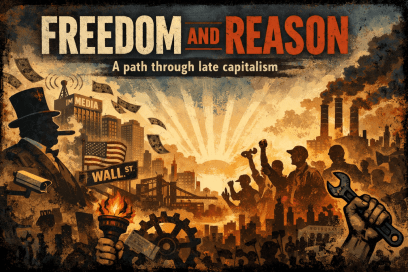I remarked recently on my Facebook feed, “Not a fan of Mitch McConnell, but mad props for keeping Merrick Garland off the Supreme Court. The man is utterly without principle.” This was before he was found in contempt of Congress by the House Oversight and Judiciary Committees (see AG Garland Found in Contempt and MTG’s Hypothesis Confirmed). Somebody responded that he was a lot better than the Republican appointees on the Court. So I added that Garland was an authoritarian, as well. I was then asked for an example. I gave several. This essay is based on my response.

Merrick Garland’s authoritarianism and lack of principle are well documented. More than any attorney general in recent memory, Garland has not merely politicized the Department of Justice but weaponized it against the political opponents of the Democratic Party and the corporate state establishment. The evidence for this is extensive.
Garland has initiated legal actions to block the implementation of state laws, effectively pitting the federal government against elected state bodies aligned with their constituents’ preferences. These actions undermine the principle of federalism that lies at the heart of our republican system of governance. He has, moreover, pursued in a highly selective manner matters where the DOJ might have cause to act, a pattern indicative of political bias. For example, Garland has sued red states over redistricting yet left alone blue states to gerrymander. Eschewing strict adherence to evidence-based pursuit of justice for crimes falling beyond state jurisdiction, Garland’s pursuit of criminal prosecutions is typically framed in such a way as to capture mass media attention. He uses his position as propagandist for the administrative state and the Democratic Party.
Garland has employed federal investigatory powers in a coercive manner even when cases haven’t reached the courtroom. For those that have reached the courtroom, Garland’s actions have been disproportionate. Taking up the second first, his pursuit of January 6 protestors has been relentless even though only a handful of protestors were involved in violent confrontation with police officers. The vast majority of those present in and around the Capitol at best committed misdemeanors (trespassing and obstruction of official proceedings, for the most part, the latter elevated to felony obstruction), yet hundreds were kept in pretrial detention for months and some for years. When tried, prosecutors recommended prison terms of excessive length. Nearly 1300 individuals have been arrested and charged so, most of them convicted, and nearly 500 thrown into prison.
The DOJ’s creation of a task force used to intimidate parents challenging school boards over masks and vaccine mandates, school closures, the distribution of pornographic materials, the employment of SEL, as well as gender and race indoctrination in public schools is an example of his abuse of federal power. Garland claims those persons were targeted for violent action or making threats of violence. But most incidents involved neither violence nor threats of violence. When hauled before Congress to explain this, Garland perjured himself over the memo in question and misled Congress about why he wasn’t dismantling the task force. Even senior FBI veterans sounded the alarm over Garland’s misuse of anti-terrorism tools to intimidate concerned parents. Undeterred, Garland enlarged the program to include the intimidation of citizens with FBI’s “knock and talk” tactics.
Garland has issued policy directives that circumvent congressional legislation, positioning the Justice Department not just as an enforcer but a determiner of law. Indeed, Garland’s selective application of federal statutes is notorious. No charges were brought against individuals protesting and threatening violence against individuals outside a Supreme Court justice’s home, which is against federal law, yet Garland pursued charges again Mark Houck, a Pennsylvania anti-abortion demonstrator who peacefully protested outside an abortion clinic. Thankfully, Houck was acquitted, but he and his family had to suffer the terrifying experience of a federal SWAT raid on his house. Douglass Mackey was not so lucky. The DOJ went after Douglass Mackey for satirical voting ads on Twitter and secured a prison sentence.
In the raid of Trump’s Mar-a-Logo to retrieve documents implicating the Obama Administration in an unlawful counterintelligence operation (Crossfire Hurricane) against Hillary Clinton’s political opponent, Donald Trump, Garland allowed the leak of classified information by the DOJ (remember that Edward Bernays-style frameup?) classified information manipulated by FBI agents. This is why the documents trial has been indefinitely suspended. In the resurrected zombie case in Manhattan, Garland deployed a top prosecutor in his Washington officer, Matthew Colangelo, to handle the case because Alvin Bragg wasn’t up to prosecuting a case for which there is no underlying felony. The DOJ is playing a central role in the lawfare campaign being waged against the front runner for the President of the United States.
Having a man like this on the Supreme Court knowing that he might have an opportunity to rule on matters of the First, Second, and Fourth Amendments, etc., was so terrifying of a prospect that the Republican Party took the extraordinary step of not even allowing his nomination to proceed to a congressional vote. Thank God. Imagine had Garland not been stopped and Clinton had won the 2016 election. Given their illiberal governing philosophy, with two of three more Supreme Court justices, these authoritarians would have control over the court for a generation—a truly terrifying possibility. We dodged a huge bullet in 2016 with the election of Trump. After the 2020 steal, it only made sense that Garland would be the Attorney General of the United States. You can add to his unprincipled and authoritarian character a desire to hit back at the party that kept him off the Supreme Court.
My response is based on numerous sources. Most helpful were articles and op-eds published in the National Review over the last couple of years.
